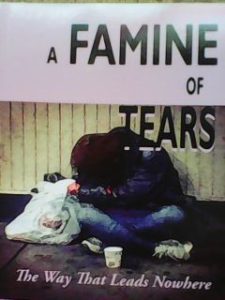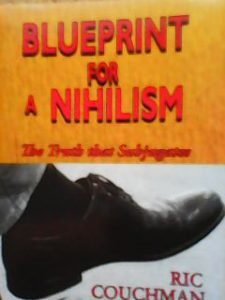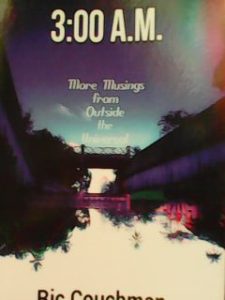by Petamber Persaud
(Extract of an interview with Ric Couchman, Georgetown, Guyana, September, 2016. Mr Couchman is an outdoorsman who would be launching four books of poetry on Friday Oc. 21, 2016 at the International Learning Institute, Queenstown)

PP Whenever I introduce a book, I’d usually describe it as a treat – a literary treat, a literary delight. But to be introducing four books – I’d say this is a banquet. I noticed that in one of these books, you advised the reader against rushing through the poems. In other words, you advised the reader to savour each poem like taking a sip of honey.Why have you taken to poetry to express your thoughts?
RC It really began in high school. Well, we could go a little way back – one of the unique aspects of education in the past was the introduction of nursery rhymes to children; so I grew up on nursery rhyme and there was something fun about them. What I particularly love about nursery rhyme was the stories they told. And they were short, compressed but the stories were palpable, rich, funny and I loved them.
PP Also they were teaching aids – we learnt to count, we learnt the days of the week, the number of days in a month etc., etc., without the didactic and pedantic elements.
RC In addition to that: my high school teacher, Marjorie Cambridge, was a phenomenal teacher, who with enthusiasm and passion, shared with the class, the poetry we studied.
And then we were introduced to narrative poetry…
PP A Book of Narrative Verse
RC I still have my copy to this day….
PP Before we have a go at the poems, let’s locate Ric Couchman. Who is Ric Couchman?
RC I was born in Bagottown on the East Bank [Demerara, Guyana] and I literally spent my formative days in trees. I loved climbing trees, fruit trees of course, especially during the school holidays, form morning to evening…
I remember there was this jamoon tree at the back of the yard which was not too far from the bank of the [Demerara] river, and I could see what’s happening all around me and I would quietly sit there and observe things – the goats eating the plantain skins on the rubbish heap; I would watch the fishermen walking along the sea dam going to their boats; I would hear the different exchanges between parents and children, and adults and adults…So I was essentially a watcher, an observer.
Also I had a strong imagination. I would spend a lot of time drawing stick figures, creating stories…Then there was the cinema. My mom would take me to the nearby cinema…
PP Rajmahal or Indramahal, I can’t remember which although I spent my August school holidays in Peter’s Hall – the next village.
RC The Indramahal.I was enamoured by the black and white movies.So I consider myself to be a lover of the arts, all forms of art.
And a thinker. And the thinking aspect was born and bred right here; my intellectual background has its basis here in our country, Guyana, I didn’t have to go abroad to get that; we had a solid educational foundation in Guyana.
I attended Covent Garden Secondary School and it was a fantastic experience….
PP As you talked about trees, I recall that one of our foremost historians, Clem Seecharan, declaring that he came from bookless world yet he would find himself sitting in trees reading, reading while keeping watch over the cattle in the pasture and he has gone on to write huge tomes of history.
Now it seems as if this is another tip for emerging writers – climb a tree and observe.…
RC Yes, there is something about a tree – it is majestic, sublime, silent, yet pregnant with thoughts, it is full of life and energy, it gives birth that which we can use for nourishment…the tree is something special especially in a country like ours; it’s an awesome thing to sit in a tree, among its branches…
PP Jeremy Poynting did publish an essay on Guyanese literature and the landscape and here we are making a direct reference to a particular aspect of that landscape – the tree.
Now, this talk of the tree has me thinking about the sea – trees and seas – and about great pieces of literature that were influenced by the seas, and the many splendid holidays I spent in Peter’s Hall, neighbouring to Bagottown, where you spent your formative days.
In Peter’s Hall, I passed much of my time in trees, fruit trees, and boating…but above all, I like visiting the farm of my grandparents which was located in Mocha [Village] and there I acquired the taste for peach…here also where there was little or no human sounds, I felt the calm, and peace and quietude despite the fact it was sometimes made eerie by the bloodcurdling cries of the jumbie birds …
RC Let’s not forget the tree in folklore which brings to mind the silk cotton tree in the backdam…I’ve written about it in one of these books; it is called ‘white lady under di silk cotton tree’…
PP There are poems and there are poems, there is poetry and there is poetry, what is different about your poetry?
RC Well, from a literary point of view, I’ve combined them with photographic images which complement the theme/subject of the poems…Secondly, the poems are universal while coming from someone who comes out of a Caribbean context and a South American context, depending on which one I claim…Thirdly, there is a Western influence intertwined in them…
PP Like how you have used the Guyanese folklore in your poetry
RC Yes.
But to go a bit further, there is a strong classical influence; I grew up on Greek/ Roman/Latin literature and so my poetry is filled with allusions to the above and to world events and people…
But although my poetry may appear sophisticated and sort of intellectual, there are readily available to the average reader
PP …because of the way you use the language…
RC …Yes, and each of my poem tells a story…
PP Earlier, we touched on your efforts to put your poetry to music but before we expand on that let’s looked at a vexing subject: the decline in the imprecation of poetry… (TO BE CONTINUED)
Responses to this author telephone (592) 226-0065 or email: oraltradition2002@yahoo.com







